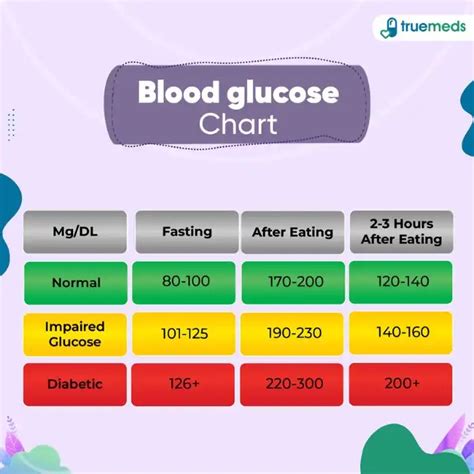Intro
Learn about normal blood sugar levels, glucose targets, and healthy range management to prevent diabetes and hypoglycemia, maintaining optimal blood glucose control.
Maintaining normal blood sugar levels is crucial for overall health and well-being. Blood sugar, also known as glucose, is the primary source of energy for the body's cells. When blood sugar levels are within a normal range, the body functions optimally, and the risk of developing chronic diseases like diabetes, heart disease, and stroke is reduced. In this article, we will delve into the importance of normal blood sugar levels, the factors that influence them, and provide guidance on how to maintain a healthy blood sugar balance.
The human body is designed to regulate blood sugar levels within a narrow range, typically between 70 and 110 milligrams per deciliter (mg/dL). When blood sugar levels exceed this range, it can lead to a range of health problems, from mild symptoms like fatigue and blurred vision to more severe complications like nerve damage, kidney disease, and even death. Therefore, understanding the factors that affect blood sugar levels and taking steps to maintain normal levels is essential for preventing and managing chronic diseases.
Normal blood sugar levels are influenced by various factors, including diet, physical activity, stress, and sleep. A healthy diet that is rich in whole foods, such as fruits, vegetables, whole grains, and lean proteins, can help regulate blood sugar levels. Regular physical activity, like walking or jogging, can also improve insulin sensitivity, which helps the body to more effectively use insulin, a hormone that regulates blood sugar levels. Additionally, managing stress through techniques like meditation or yoga and getting adequate sleep can also contribute to maintaining normal blood sugar levels.
Understanding Blood Sugar Levels

To understand blood sugar levels, it's essential to know how the body regulates glucose. After eating, the body breaks down carbohydrates into glucose, which is then absorbed into the bloodstream. The pancreas, an organ located behind the stomach, releases insulin, a hormone that helps cells absorb glucose from the bloodstream. As glucose enters the cells, blood sugar levels decrease. Conversely, when blood sugar levels are low, the pancreas releases glucagon, a hormone that stimulates the liver to release stored glucose into the bloodstream, increasing blood sugar levels.
Factors That Influence Blood Sugar Levels
Several factors can influence blood sugar levels, including: * Diet: Consuming high amounts of sugary or refined foods can cause blood sugar levels to spike. * Physical activity: Regular exercise can improve insulin sensitivity, while a sedentary lifestyle can decrease it. * Stress: Chronic stress can raise blood sugar levels by increasing the production of stress hormones like cortisol. * Sleep: Poor sleep quality or duration can disrupt blood sugar regulation. * Medications: Certain medications, such as steroids and certain psychiatric medications, can raise blood sugar levels.Maintaining Normal Blood Sugar Levels

Maintaining normal blood sugar levels requires a comprehensive approach that incorporates healthy lifestyle habits, including:
- Eating a balanced diet that is rich in whole foods and low in added sugars and refined carbohydrates.
- Engaging in regular physical activity, such as walking or jogging, for at least 150 minutes per week.
- Practicing stress-reducing techniques, like meditation or yoga, for at least 30 minutes per day.
- Getting adequate sleep, aiming for 7-9 hours per night.
- Monitoring blood sugar levels regularly, especially if you have diabetes or are at risk of developing it.
Benefits of Maintaining Normal Blood Sugar Levels
Maintaining normal blood sugar levels offers numerous benefits, including: * Reduced risk of chronic diseases, such as diabetes, heart disease, and stroke. * Improved energy levels and mental clarity. * Enhanced physical performance and endurance. * Healthier weight management. * Reduced risk of cognitive decline and dementia.Testing Blood Sugar Levels

Testing blood sugar levels is crucial for diagnosing and managing diabetes, as well as for monitoring blood sugar control. There are several ways to test blood sugar levels, including:
- Fasting plasma glucose test: This test measures blood sugar levels after an overnight fast.
- Oral glucose tolerance test: This test measures blood sugar levels after consuming a sugary drink.
- Random plasma glucose test: This test measures blood sugar levels at any time of day.
- Continuous glucose monitoring: This test uses a small device to track blood sugar levels throughout the day.
Interpreting Blood Sugar Test Results
Interpreting blood sugar test results requires understanding the normal ranges for blood sugar levels. The American Diabetes Association recommends the following ranges: * Normal: Less than 100 mg/dL (fasting) or less than 140 mg/dL (after eating). * Prediabetes: 100-125 mg/dL (fasting) or 140-199 mg/dL (after eating). * Diabetes: 126 mg/dL or higher (fasting) or 200 mg/dL or higher (after eating).Managing Blood Sugar Levels

Managing blood sugar levels requires a comprehensive approach that incorporates lifestyle modifications, medication, and regular monitoring. The following tips can help:
- Work with a healthcare provider to develop a personalized treatment plan.
- Monitor blood sugar levels regularly to track progress and make adjustments as needed.
- Take medication as prescribed, and attend follow-up appointments to monitor progress.
- Make healthy lifestyle changes, such as eating a balanced diet, engaging in regular physical activity, and managing stress.
Common Blood Sugar Medications
Several medications are available to help manage blood sugar levels, including: * Metformin: A medication that improves insulin sensitivity and reduces glucose production in the liver. * Sulfonylureas: Medications that stimulate the pancreas to release more insulin. * Meglitinides: Medications that stimulate the pancreas to release more insulin. * Thiazolidinediones: Medications that improve insulin sensitivity.Preventing Blood Sugar Imbalances

Preventing blood sugar imbalances requires a proactive approach that incorporates healthy lifestyle habits, including:
- Eating a balanced diet that is rich in whole foods and low in added sugars and refined carbohydrates.
- Engaging in regular physical activity, such as walking or jogging, for at least 150 minutes per week.
- Practicing stress-reducing techniques, like meditation or yoga, for at least 30 minutes per day.
- Getting adequate sleep, aiming for 7-9 hours per night.
- Monitoring blood sugar levels regularly, especially if you have diabetes or are at risk of developing it.
Risk Factors for Blood Sugar Imbalances
Several risk factors can increase the likelihood of developing blood sugar imbalances, including: * Family history of diabetes or prediabetes. * Obesity or being overweight. * Physical inactivity. * Poor diet. * Certain medications, such as steroids and certain psychiatric medications. * Pregnancy or giving birth to a baby over 9 pounds.Conclusion and Next Steps

In conclusion, maintaining normal blood sugar levels is crucial for overall health and well-being. By understanding the factors that influence blood sugar levels and taking steps to maintain a healthy balance, individuals can reduce their risk of developing chronic diseases like diabetes, heart disease, and stroke. If you are concerned about your blood sugar levels or have questions about how to maintain normal levels, consult with a healthcare provider for personalized guidance and support.
We encourage you to share your thoughts and experiences with maintaining normal blood sugar levels in the comments below. Additionally, if you found this article informative, please share it with others who may benefit from this information.
What are normal blood sugar levels?
+Normal blood sugar levels are typically between 70 and 110 milligrams per deciliter (mg/dL). However, this range may vary depending on the individual and the time of day.
How can I maintain normal blood sugar levels?
+Maintaining normal blood sugar levels requires a comprehensive approach that incorporates healthy lifestyle habits, including eating a balanced diet, engaging in regular physical activity, practicing stress-reducing techniques, and getting adequate sleep.
What are the risks of high blood sugar levels?
+High blood sugar levels can increase the risk of developing chronic diseases like diabetes, heart disease, and stroke, as well as cause symptoms like fatigue, blurred vision, and nerve damage.
How can I test my blood sugar levels?
+There are several ways to test blood sugar levels, including fasting plasma glucose tests, oral glucose tolerance tests, random plasma glucose tests, and continuous glucose monitoring.
What are the benefits of maintaining normal blood sugar levels?
+Maintaining normal blood sugar levels offers numerous benefits, including reduced risk of chronic diseases, improved energy levels and mental clarity, enhanced physical performance and endurance, and healthier weight management.
